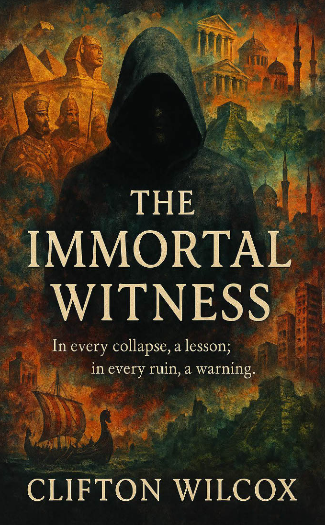Reviewed by Ephantus Gold
“The Immortal Witness” by Clifton Wilcox is a deeply meditative work of historical fiction narrated by a timeless figure, Aamon, who claims to have lived for millennia. Throughout his existence, he maintains that he has witnessed the rise and fall of civilizations, the triumphs of builders of empires, the victims of their collapse, and the descent of the powerful into cruelty. He is a sole observer, who blends into every era without leaving a footprint and whose survival depends on invisibility, which allows him to witness the full arc of civilizations without interference. The book is also a haunting reflection on the enduring human spirit and a chilling meditation on the cyclical nature of history. Purchase Here.
The book introduces a life-altering moment when the narrator, Charles Emory, a PhD student obsessed with the collapse of civilizations, encounters a mysterious figure named Aamon. Just as he finishes giving a lecture, the stranger slips him a myrrh-scented note saying, “You seek history’s truth. Come beneath. I’ve lived it.” Curiosity eventually overcomes skepticism, and what follows is a series of recorded conversations that feel less like interviews and more like weighty confessions from someone who has seen it all. Unbeknownst to Emory, Aamon’s revelations will not only shatter his entire understanding of history, from a sequence of past events to a haunting echo of mistakes humanity seems destined to repeat, but also leave him stunned at how a single, forgotten man can carry the memory of civilizations long buried by time.
The reader is transported through Aamon’s eyes to ancient Egypt, where the pyramids are still under construction by countless laborers, their bodies etched in the harsh realities of servitude under the merciless sun. Amid the grandeur of temple and divine kingship he observes the slow, inexorable erosion of the authority of the pharaohs, weakened by internal strife, corruption and the fading belief in their divinity. The vibrant hues of civilization begin to fade as pride and complacency crack the very stones meant to last forever.
From there Aamon takes the reader into the structured grandeur of the Achaemenid Persian Empire during a period of unprecedented expansion and seemingly limitless power. Here, though the conquered people are offered stability and protection, the price of this order is very steep. Paradoxically, the seeds of the empire’s decline are sown in its very success. At its borders, unity becomes more difficult to maintain as internal conflict grows, subtly but steadily challenging the central government’s control and authority. Once again, Aamon senses the tremors of collapse begin to stir beneath the surface.
This is a book that is rich and deeply layered with philosophical themes that unfold through a long, often melancholic observation of history. They go beyond historical, into being moral, cyclical and existential. From Egypt’s divine kings to Rome’s self-defying emperors, the narrative deftly shows how absolute power can quickly degrade into spectacle and how no empire is immune when it grows too strong to question itself. While the book laments the fall of civilization after civilization, it never denies the beauty of the human drive, nor the quiet endurance of the human spirit, even as it destroys itself time and time again.
Readers will appreciate how the author’s language is often poetic and how he deftly crafts sentences that echo memory, time and decay, giving even the simplest observations a mythic weight. Wilcox also employs short quotable lines that feel like distilled wisdom while offering moments of pause and reflection reinforcing the meditative pacing. His approach is emotionally grounded and allows deep, resonant reflections on power and collapse without ever feeling dull. He has hewn characters from two timelines and they go beyond being mere individuals into embodying contrasting worldviews. Their dynamic beautifully creates the emotional core of the narrative, turning this historical recollection into something intimate, human and deeply personal.
“The Immortal Witness” by Clifton Wilcox is not your conventional historical fiction but something richer and more introspective. Unlike other books in its genre, this book doesn’t just recount history but rather mourns it, questions it and ultimately humanizes it, urging readers to see themselves reflected in the ruins of the past. As the protagonist reminds us, “History doesn’t preserve truth. It preserves mistakes.” In that single line lies the novel’s quiet power- a warning, a remembrance as well as a plea not to forget. Thoughtful readers who enjoy meditative storytelling, history enthusiasts as well as book clubs looking for a rich discussion material on power, pride and collapse will find much to reflect on in these pages.
